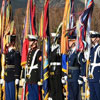World War II Victory Day in the United States
World War II Victory Day in the United States is held on May 8. This event in the first decade of the month May is annual.  Help us
Help us

The event revolves around a recently announced political realignment: US President Donald Trump has announced on the Truth Social platform that May 8 will in future be celebrated as World War II Victory Day in the United States. This change is intended to further emphasize the role and contribution of the USA in the Second World War - a representation in which the American armed forces are highlighted as decisive and incomparable in the triumph over the National Socialist regime.
Historically, May 8 marks the end of the Second World War in Europe in many European countries. On that day in 1945, the unconditional surrender of Nazi Germany was signed, which is celebrated as a symbol of liberation and victory in countries such as France, the Czech Republic and Slovakia. It is striking that in Russia the idea of victory was placed on May 9 for practical reasons - due to the different dates of the surrender documents. Trump's intention to introduce a national celebration on May 8th ties in directly with this historical symbolism, but shifts it into a new, US-related context.
Parallel to this plan, Trump is also planning to rename another important day: Veterans Day, which is currently celebrated annually on 11 November in honor of veterans, will in future be known as Victory Day in the First World War. This double reassignment - 8 May for the Second World War, 11 November for the First - serves to emphasize the military brilliance and sacrifice of the US armed forces in both world wars. In Trump's words, there has been little “proper celebration” to date, despite the US contributions in both conflicts being outstanding.
The political and symbolic implications of this move are particularly noteworthy: While many countries with long-standing traditions celebrate the victory over Nazi Germany on May 8, this day has tended to be an unremarkable date in the US, not associated with any specific commemorative culture. Trump's announcement aims to strengthen national self-image and pride - but it also triggers criticism because the exaggerated emphasis on the American contribution can be interpreted as overly revisionist and potentially provocative towards the merits of the Allied nations. Such a recontextualization of history shows how historical events are repeatedly used as political tools to underpin current national narratives.
If you delve further into the topic, a broad discourse opens up on how and to whom commemorative days in history are given their meaning. In addition to the close connection between commemoration days and nations and their identity projections, international reactions also play a role - especially when historical events are constantly renegotiated.
Similar holidays and events, festivals and interesting facts
 Soldier's Day in El Salvador on May 7 (Día del soldado);
Soldier's Day in El Salvador on May 7 (Día del soldado); Peace Officers Memorial Day on May 15 (United States);
Peace Officers Memorial Day on May 15 (United States); National Armed Forces Day in US on May 16 (celebrated on the third Saturday of May);
National Armed Forces Day in US on May 16 (celebrated on the third Saturday of May); Dien Bien Phu Victory Day in Vietnam on May 7
Dien Bien Phu Victory Day in Vietnam on May 7 Veterans Day in Norway on May 8
Veterans Day in Norway on May 8 Day of the Military Police of the National Armed Forces in Indonesia on May 11
Day of the Military Police of the National Armed Forces in Indonesia on May 11 Army Day in Slovenia on May 15
Army Day in Slovenia on May 15 Polish Border Guard Day on May 16
Polish Border Guard Day on May 16